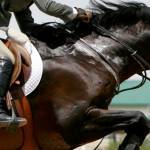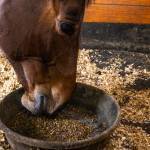Factors in Lost Training Days for Horses

Some horses seem to lose a lot of training days to injuries, while others almost never need time off to heal. In between these extremes are the majority of horses that have an occasional injury or lameness but do not need to be taken out of work on a regular basis. Is the difference due to something about how these horses are conformed, or ridden, or fed, or is some other factor involved?
At the Swedish University of Agricultural Sciences, scientists led by professor and veterinarian Agneta Egenvall conducted research to uncover answers to this question. They examined the records of elite show jumpers to see why horses missed training days. The records pertained to horses in the Netherlands, Sweden, Switzerland, and the United Kingdom. Results showed that a combination of several factors usually made the difference in whether horses suffered injuries and how long it took them to recover and return to training.
- Among the 263 horses in the study, 126 missed a total of 2,357 days out of 39,028 cumulative days they should have been actively training. Orthopedic injuries were responsible for more than 75% of the missed training days.
- If a horse had suffered a previous orthopedic injury and then was reinjured, it took about twice as long to get that horse back into training compared to a horse recovering from an initial injury.
- Horses that always did the same type of work in the same location were more likely to be injured than horses that had a varied work program encompassing different locations and activities.
- There was little correlation between level of work and days off because of injury.
- There was some evidence that hard-working horses that suffered injuries might not have had sufficient training to be performing at that level.
- Horses in the U.K. had the fewest days off training. According to Egenvall, this difference could be related to cultural differences in deciding when a horse needed a training break, or might relate to the success of different management styles in preventing injuries.
The research suggests that varying workouts, thereby stressing different sets of muscles, might help in keeping horses injury-free. Giving injured horses sufficient time to heal is also a good management plan to avoid a longer time out of training because of a recurrence.








